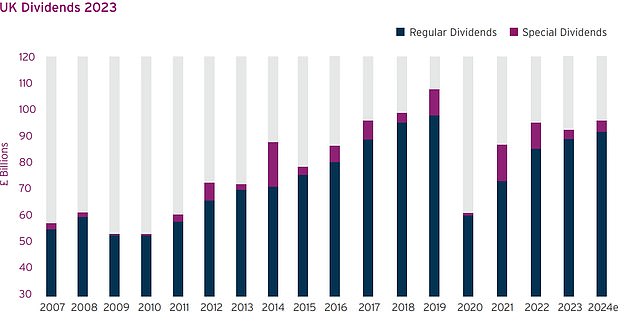Higher interest rates force banks to pay out more dividends than any other sector
- Companies paid out £90.5 billion in 2023, driven by the banking sector
- According to Computershare, payouts rose by almost a third to £13.8 billion
- Energy and utilities continued to drive dividend growth, but mining weakened
Dividend payments by UK listed companies rose to £90m last year, with banks taking the lead thanks to higher interest rates.
The headline figures show dividends fell 3.7 per cent to £90.5 billion in 2023, but this was largely due to lower one-off special dividends.
Underlying growth was significantly better, with regular dividends up 5.4 percent to £88.5 million, according to Computershare’s Dividend Monitor, with much of the growth coming in the last quarter.
HSBC was the biggest driver of dividend payment growth last year
Dividends rose 15.6 percent in the fourth quarter, largely thanks to HSBC, which restored quarterly payouts for the first time since the pandemic, and the broader banking sector.
It is the first time that banks have become the largest paying sector since 2007, increasing their payouts by almost a third to £13.8 billion by 2023.
Mark Cleland of Computershare said: ‘The banks’ return to prominence is truly remarkable.
‘Thirteen years of very low interest rates have made it very difficult for the sector to make profits, but the need to curb inflation with higher interest rates means the past two years have seen a dramatic turnaround.
“Bank investors are reaping the benefits of this turnaround and we expect them to see even bigger payouts in 2024.”
Higher energy prices boosted oil company dividends by 15.8 percent, while utility payouts hit a record high thanks to inflation-related policies.

Mining companies had the biggest negative impact with a decline of £4.5 billion, or 28.4 percent, over the year due to weakened commodity prices. But the sector still accounted for £1 in every £8 handed out by British companies last year.
Computershare also highlighted the impact of some large buyback programs on payouts.
Companies that feel that the current share price does not reflect their true value tend to buy back shares to increase their earnings per share.
In the fourth quarter, homebuilder Vistry canceled its fourth-quarter dividend and used the money to buy back shares.
Natwest, Aviva, HSBC, BP, Glencore and Centrica are other big names involved in share buyback programs.
Without share buybacks, Computershare calculates that underlying dividend growth would have been 7.2 percent last year.
Cleland said: “Payouts may remain below pre-pandemic levels, but significantly larger share buyback programs have provided an alternative route to channel excess capital to shareholders.
“These programs also obscure the extent to which dividends actually increase by reducing the number of shares outstanding. This is not to say that buybacks or dividends are superior; they just represent a different way of cutting the cake.”
Computershare expects that the largest dividend-paying sectors – banking and oil – are likely to grow more slowly in 2024, while mining is likely to decline further.
It forecasts that underlying dividend growth in the UK will slow to 2 percent this year, meaning regular dividends of £89.9 billion and a total total of £93 billion.
